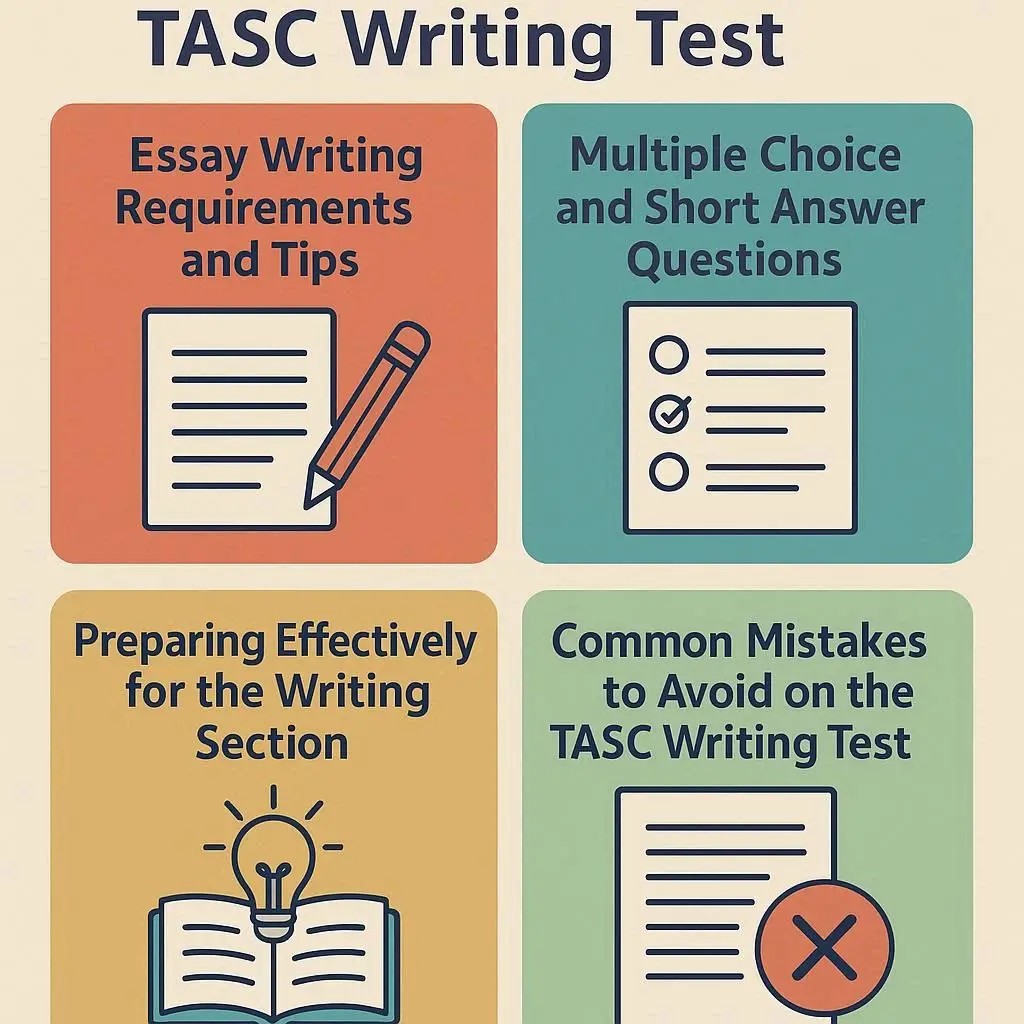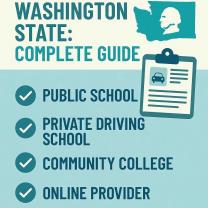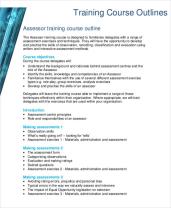What kind of questions are on the TASC writing test?
What Questions Are on the TASC Writing Test?
The TASC (Test Assessing Secondary Completion) is an alternative to the GED, designed to evaluate high school equivalency skills. The writing section of the TASC tests your ability to communicate clearly, organize ideas, and demonstrate proper grammar and sentence structure.
Overview of the TASC Writing Test
The writing section consists of two main parts: multiple-choice questions and an essay. Both assess your writing, grammar, and language skills, ensuring you can effectively communicate in written English.
Types of Questions on the TASC Writing Test
1. Multiple-Choice Questions
These questions focus on:
Grammar and Usage: Identifying and correcting errors in sentences.
Punctuation: Using commas, periods, semicolons, and other punctuation correctly.
Sentence Structure: Recognizing fragments, run-on sentences, and correct sentence construction.
Word Choice and Style: Selecting the most appropriate words or phrases for clarity and tone.
Revision and Editing: Improving paragraphs by correcting errors and enhancing flow.
2. Essay Question
The essay requires you to write a coherent, well-organized response to a prompt.
You are usually asked to explain your opinion, analyze a situation, or provide a solution to a problem.
Scoring focuses on:
Organization: Clear introduction, supporting paragraphs, and conclusion.
Content: Relevant examples and logical reasoning.
Grammar and Mechanics: Correct spelling, punctuation, and sentence structure.
Clarity and Style: Cohesive and concise writing.
Tips for Success on the TASC Writing Test
Practice grammar exercises and sentence correction.
Plan your essay with an outline before writing.
Use clear and concise language, avoiding overly complex words.
Review and edit your essay for errors before submitting.
The TASC writing test evaluates both your technical writing skills and your ability to express ideas effectively. By understanding the types of questions and practicing your grammar, punctuation, and essay writing, you can improve your chances of passing this section with confidence.
The TASC Writing Test assesses your ability to understand and express ideas clearly and effectively in written English.
Types of Questions on the TASC Writing Test
The TASC Writing Test is comprised of two main sections:
Constructed Response (Essay): This is a timed essay where you'll be given a prompt, often based on a short passage or a pair of passages, and asked to write an argumentative, explanatory, or analytical essay.
This section assesses your ability to organize thoughts, present a clear argument, support it with evidence, and write grammatically correct sentences. Selected Response (Multiple Choice) and Technology-Enhanced Items: This section focuses on your understanding of English language conventions. These questions cover areas such as grammar, sentence structure, punctuation, capitalization, spelling, and organization of ideas within a paragraph or passage.
Some questions might require you to select multiple answers, drag and drop, or highlight text.
Essay Writing Requirements and Tips
The essay portion is a critical component of the TASC Writing Test. Here are key requirements and tips:
Understanding the Prompt: Carefully read and understand the prompt. Identify the specific task (e.g., argue a point, explain a concept, analyze a text) and the topic.
Developing a Thesis Statement: Your essay must have a clear thesis statement in the introduction that states your main argument or the central idea you will develop.
Organizing Your Essay: A well-structured essay typically includes:
Introduction: Hook, background information, and thesis statement.
Body Paragraphs: Each paragraph should focus on a single main idea that supports your thesis. Use topic sentences to introduce the main idea of each paragraph.
Evidence and Elaboration: Support your points with specific details, examples, and evidence from the provided passage(s) or your own knowledge. Explain how your evidence supports your claim.
Conclusion: Summarize your main points, restate your thesis in new words, and offer a concluding thought or broader implication.
Clarity and Cohesion: Ensure your ideas flow logically from one paragraph to the next using transition words and phrases (e.g., "furthermore," "however," "in addition," "consequently").
Grammar and Mechanics: Pay close attention to grammar, punctuation, capitalization, and spelling. Proofread meticulously.
Errors in these areas can significantly lower your score. Word Count/Length: While there isn't a strict word count, aim for a well-developed essay that adequately addresses the prompt, typically around 400-600 words. Quality over quantity is key, but sufficient length is needed to demonstrate your writing ability.
Time Management: Allocate your time wisely. Spend a few minutes planning and outlining your essay before you start writing.
Multiple Choice and Short Answer Questions
The selected response questions assess your knowledge of English language conventions:
Grammar: Identifying and correcting errors related to subject-verb agreement, pronoun usage, verb tense, modifiers, etc.
Punctuation: Correct use of commas, semicolons, colons, apostrophes, quotation marks, and end punctuation.
Capitalization: Proper capitalization of proper nouns, beginning of sentences, etc.
Spelling: Identifying misspelled words within a context.
Sentence Structure: Recognizing run-on sentences, sentence fragments, and awkward phrasing, and choosing the most clear and concise way to express an idea.
Organization and Style: Questions may ask about the best way to combine sentences, arrange paragraphs for logical flow, or choose the most appropriate word for a given context.
Short answer questions, if present, would require you to provide a brief, direct response, often focusing on comprehension or interpretation of a short text.
Preparing Effectively for the Writing Section
Effective preparation for the TASC Writing Test involves a combination of focused study and practice:
Review Grammar Rules: Brush up on fundamental grammar rules. Use grammar textbooks, online tutorials, and practice exercises.
Practice Essay Writing: Write practice essays regularly. Use TASC-style prompts if available. Time yourself to simulate test conditions.
Read Widely: Reading a variety of texts (news articles, essays, non-fiction books) helps improve vocabulary, sentence structure recognition, and overall comprehension.
Study Sample Essays: Analyze successful sample essays to understand what makes a high-scoring response.
Pay attention to how arguments are developed and supported. Focus on Outlining: Practice creating quick outlines before writing your essays. This helps organize your thoughts and ensures a logical flow.
Proofreading Practice: Develop a habit of carefully proofreading your work for errors in grammar, spelling, and punctuation.
Read your essay aloud to catch awkward phrasing. Utilize Official Resources: Use study guides and practice tests provided by the official TASC test developers or educational organizations.
Common Mistakes to Avoid on the TASC Writing Test
Being aware of common pitfalls can help you avoid losing points unnecessarily:
Not Addressing the Prompt Fully: Make sure your essay directly answers all parts of the question. Don't go off-topic.
Lack of a Clear Thesis: An essay without a strong, explicit thesis statement will lack direction and a central argument.
Insufficient Evidence/Support: Do not rely on generalizations. Back up every claim with specific details, examples, or evidence from the provided text.
Poor Organization: A disorganized essay with disjointed paragraphs and a lack of transitions will be difficult to follow.
Grammar and Mechanical Errors: Careless mistakes in grammar, punctuation, and spelling detract from your score and can make your writing unclear. Allocate time for thorough proofreading.
Informal Language/Slang: Maintain a formal and academic tone throughout your essay. Avoid slang, colloquialisms, or overly casual language.
Plagiarism/Copying: If passages are provided, use them as inspiration and evidence, but do not copy directly without proper quotation marks and attribution. Paraphrase and summarize in your own words.
Rushing: While time management is important, rushing through the essay can lead to errors, underdeveloped ideas, and a messy structure. Plan, write, and then review.













